All the islanders are more or less in the habit of anointing themselves; the women preferring the "aker" or "papa," and the men using the oil of the cocoa-nut. Mehevi was remarkably fond of mollifying his entire cuticle with this ointment. Sometimes he might be seen with his whole body fairly reeking with the perfumed oil of the nut, looking as if he had just emerged from a soap-boiler's vat, or had undergone the process of dipping in a tallow-chandlery. To this cause, perhaps, united to their frequent bathing, and extreme cleanliness, is ascribable, in a great measure, the marvellous purity and smoothness of skin exhibited by the natives in general.
The prevailing tint among the women of the valley was a light olive, and of this style of complexion Fayaway afforded the most beautiful example. Others were still darker, while not a few were of a genuine golden colour, and some of a swarthy hue.
As agreeing with much previously mentioned in this narrative, I may here observe, that Mendanna, their discoverer, in his account of the Marquesas, described the natives as wondrously beautiful to behold, and as nearly resembling the people of Southern Europe. The first of these islands seen by Mendanna was La Madelena, which is not far distant from Nukuheva; and its inhabitants in every respect resemble those dwelling on that and the other islands of the group.
Figueroa, the chronicler of Mendanna's voyage, says, that on the morning the land was descried, when the Spaniards drew near the shore, there sallied forth, in rude procession, about seventy canoes, and at the same time many of the inhabitants (females, I presume) made towards the ships by swimming. He adds, that "in complexion they were nearly white, of good stature, and finely formed; and on their faces and bodies were delineated representations of fishes and other devices." The old Don then goes on to say, "There came, among others, two lads paddling their canoe, whose eyes were fixed on the ship; they had beautiful faces, and the most promising animation of countenance, and were in all things so becoming, that the pilot-mayor, Quiros, affirmed, nothing in his life ever caused him so much regret as the leaving such fine creatures to be lost in that country."
Some of the natives present at the Feast of Calabashes had displayed a few articles of European dress, disposed, however, about their persons after their own peculiar fashion. Among these I perceived the two pieces of cotton cloth which poor Toby and myself had bestowed upon our youthful guides the afternoon we entered the valley. They were evidently reserved for gala days; and during those of the festival they rendered the young islanders who wore them very distinguished characters. The small number who were similarly adorned, and the great value they appeared to place upon the most common and most trivial articles, furnished ample evidence of the very restricted intercourse they held with vessels touching at the island. A few cotton handkerchiefs of a gay pattern, tied about the neck, and suffered to fall over the shoulders, strips of fanciful calico, swathed about the loins, were nearly all I saw.
Indeed, throughout the valley, there were few things of any kind to be seen of European origin. All I ever saw, besides the articles just alluded to, were the six muskets preserved in the Ti, and three or four similar implements of warfare hung up in other houses, some small canvas bags, partly filled with bullets and powder, and half a dozen old hatchet-heads, with the edges blunted and battered to such a degree as to render them utterly worthless. These last seemed to be regarded as nearly worthless by the natives; and several times they held up one of them before me, and throwing it aside with a gesture of disgust, manifested their contempt for anything that could so soon become unserviceable.















